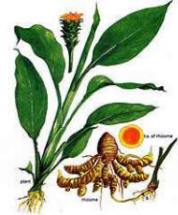Turmeric in Chemotherapy,
(Turmeric -Curcumin)
Prevents Reverses Cancer
Turmeric Health page Link
Turmeric makes anti-cancer drugs more powerful. G.S. Mudur

ReportsSome tumors are robust enough to resist chemotherapy
Biologist Devarajan at the RGCB has spent seven years trying to unravel the tricks that tumour cells employ to evade chemotherapeutic drugs. Now, researchers have shown that curcumin, the ingredient in turmeric that gives the spice its yellow colour, may be able to turn drug-resistant tumours susceptible to treatment.
While scientists have shown that curcumin has the ability to enhance the killing power of some anti-cancer drugs, this is the first study that describes the biological mechanisms through which the ingredient of the age-old Indian spice achieves this result.
In a report that has been accepted for publication in the Journal of Biological Chemistry, the scientists said that curcumin can make tumour cells sensitive, or more susceptible, to the chemotherapeutic action of taxol, the best anti-cancer compound isolated so far from plants.
Taxol Curcumin
Curcumin and taxol, when used in combination, induces almost double the amount of cell death compared to taxol alone, the scientists said in their paper. The importance of this study is that it demonstrates the mechanism by which curcumin can make taxol more effective at tumour-killing, says Karunagaran, a senior scientist at the RGCB who began to study the genetics of drug resistance in tumours in the late 1990s.
Both the mutations in pro-apoptotic factors and the overexpression of anti-apoptotic genes help the tumours evade death.
Deat of Cancer
The studies have shown that curcumin reduces the levels of both the enzyme and the protein in tumour cells, thus making them more vulnerable to the action of taxol. In their experiments, John Anto and her students exposed drug-resistant cancer cells to a low dose of curcumin, waited for two hours and then exposed the cells to taxol.
They found that using curcumin before taxol enhanced the killing power of taxol thro-ugh apoptosis. The increased death of tumours was due to the taxol-induced apoptosis alone and not through the effect of curcumin which is also known to kill tumours at high doses.
Interestingly, the study also showed that curcumin did not enhance the taxol-induced apoptosis in normal cervical cells. The synergistic effect of curcumin was observed only in cancer cells whose resistance to apoptosis had been induced by taxol itself. John Anto says she is now trying to repeat similar experime-nts in cells from cancers of the colon, breast and ovaries. The next step will involve establishing this action of curcumin in animals.
Karunagaran continues to investigate how tumour cells acquire resistance to drugs and how curcumin may hold the key to solving this problem. In a related study accepted last week for publication in the journal Carcinogenesis, the researchers have shown that colon cancer cells lacking a pro-apoptotic gene called Bax are resistant to the anti-cancer effect of curcumin. ?The long-term goal is to find ways to overcome drug-resistant tumours,? says Karunagaran.